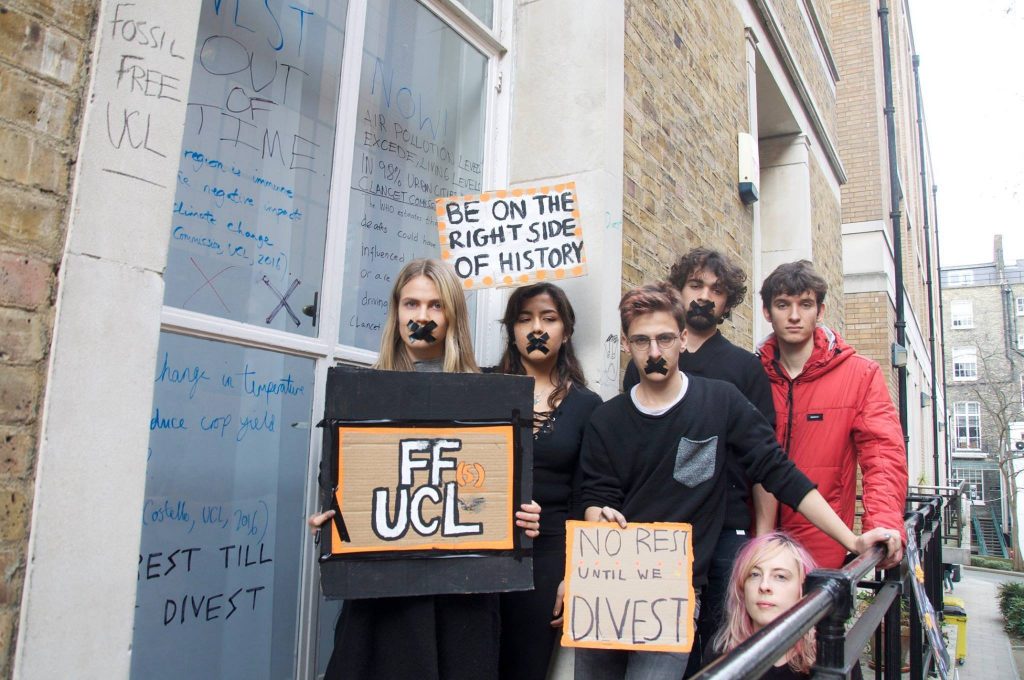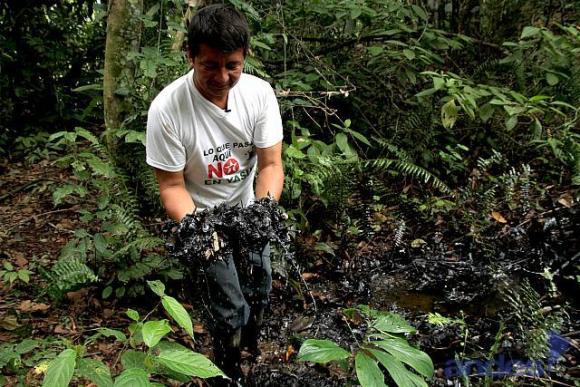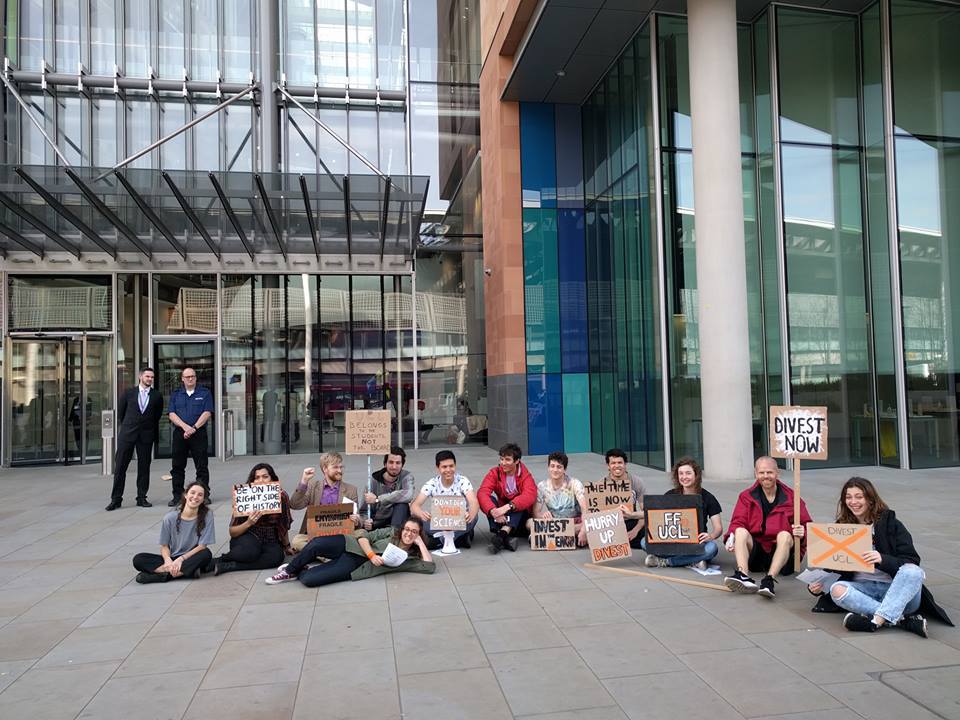OLIVIA GOLDIN and FLORENCE WILDBLOOD report on UCL’s latest failure to divest from the fossil fuel industry.
On Thursday 23rd March, a dozen students climbed up onto the UCL Provost’s office balcony to protest a damaging paradox at the heart of what UCL stands for. On one side of his second-storey window, activists scrawled the Provost’s own statements regarding management of the university’s investments; on the other half, they quoted extensively from climate change research conducted by the university he oversees. “Running UCL’s investments is a bit like playing monopoly” read the left-hand panel, starkly contrasting with “the response to climate change could be ‘the greatest global health opportunity of the 21st century’ (The Lancet Countdown, 2017)” on the right. After occupying the balcony for 26 hours, the students took their message to the Main Quad, using chalk spray to illustrate the gulf between the views of UCL’s staff and students on the one hand, and the Provost’s investment decisions on the other. They then delivered “oil-covered” roses to the Provost’s door in a funeral procession, as a reminder of the lives and environments irreversibly tarnished by the fossil fuel industry.

This was part of a fortnight of escalating daily action organised by UCL Fossil Free—a campaign calling for the university to “immediately freeze any new investment in fossil fuel companies” and to make a clear commitment to divesting from the companies it is already funding. While on the balcony, activists wore black tape crossed over their mouths to signify UCL’s repeated attempts to silence the divestment campaign: four years of deferred and broken promises were summed up last week when the university administration deleted a swathe of negative online feedback referring to its problematic investments.
Fossil Free UCL is the most supported campaign in UCL’s history, with an online petition of over 3,300 signatures, and motions passed in favour of divestment by the Student Union and the UCL Academic Board. Worldwide, almost 700 institutions, including a quarter of UK universities, have removed almost $5.5 trillion worth of investments from fossil fuels to date. Amongst others, SOAS, LSE, Queen Mary and—just a few weeks ago—KCL, have all committed to divestment.
The movement aims for respected, influential institutions such as UCL to financially, socially, and politically reject the fossil fuel industry—to remove its social license to operate. This is working: big players in the fossil fuel industry such as Shell now consider “disappearing social acceptance” their “biggest challenge”.
Meanwhile, UCL invests over £12.2 million in the fossil fuel industry and fails to break its social ties. As momentum builds amongst other University of London colleges, UCL is rapidly falling behind in paving the way for a more sustainable world. Through continuing to fund oil giants such as BP, Shell and Total, it remains complicit in their actions: while it might try to market itself as “London’s Global University”, “London’s Global Warming University” becomes a more appropriate title by the day.
Bankers bend the knee to these companies’ legendary revenues—but their profits are wrought by failing to pay for the staggering costs incurred to people and the planet. Camila Montesinos and Angie Farfán, two UCL students from Ecuador, where Texaco-Chevron has wrecked significant tracts of the Amazon and the livelihoods of Yasuni people, “are disgusted by our University’s investments in an industry that has never shown any care for the environment or people who survive from it”.

The fossil fuel industry systematically functions on exploitation and corruption, routinely disregarding the lives of vulnerable people standing in the way of profit. Shell, for example, funded the Nigerian military and police to torture and murder activists and even raid civilian villages suspected of opposing their oil activities in the Niger Delta in the ‘90s, while they failed to adhere to basic environmental safety standards in the region.
The industry then exploits these grand profits to buy political influence, whereby companies can curtail regulation and accountability frameworks that would burden the industry instead of the people. Oil spills into almost all large-scale political processes: not only do oil companies dominate international climate change negotiations, they also intrude on and define domestic politics the world-over—from Nigeria to the USA. If they didn’t have a stake in overturning the power of the people (read: democracy), why would they spend hundreds of millions of dollars lobbying every year, including over $100m lobbying Republicans in the USA 2016 election alone?
While grassroots action is catalysing a change in the political sphere, with governments such as Germany and Denmark now embracing renewable energy, political leaders have historically faced little stick from society for getting cosy with their oil-backed fund-plumpers.
We cannot let universities follow a similar model. UCL’s Council Chair, Dame DeAnne Julius, was previously Chief Economist at Shell and a member of BP’s board for ten years: the role this has undoubtedly played in decision-making has gone under the radar for far too long. As Masters student Mariam Salah highlights, UCL’s stake in such a dirty industry is deeply at odds with its reputation as a “progressive” institution. It was the first UK university to accept all students on equal terms regardless of sex, class and religion, and now consistently pushes boundaries in research related to climate science, human rights and global health. This research yields a consensus on the catastrophic effects of global warming, and seeks to develop meaningful and constructive responses. Yet the University hypocritically supports the problem as well as the solution: the emphasis on “investing sufficiently today to sustain the vision for future generations” in its mission statement seems deeply ironic when viewed alongside its actual investments. Until it divests, UCL is overlooking its most basic guiding principles and commitments.

Mere days ago on March 30th, after two weeks of consistent and concerted action and four years of campaigning, Fossil Free UCL representatives staged a demonstration at the nearby Francis Crick Institute during the UCL Council meeting on divestment. Once again, Council refused. The Provost, Michael Arthur, waved off campaigners to chants of “Provost, Provost, we know you! You have blood on your hands too!” as he entered the meeting, and pushed the Council against divestment. Despite vocally celebrating UCL’s founding culture of “radicalism and rebelliousness” in his Inaugural Lecture, the Provost derided “activism” against the fossil fuel industry, further highlighting management’s ongoing hypocrisy. The Council Chair, formerly seated inside Shell and BP, rolled her eyes at the students as she walked in. “If that isn’t a conflict of interest for the prospect of UCL’s divestment, I don’t know what is,” we heard from student activist Gianluca Cavallaro-Ng over the megaphone. Meanwhile, students experienced wide support from other passersby, including members of the public, security staff, fellow students, and academics on the Council. The disparity in opinion between the Provost and Chair and UCL’s community was thus revealed with disconcerting clarity, just as it had been on the balcony a fortnight before.
The events of Wednesday’s council meeting illuminate UCL’s continued inability to extricate itself from the growing neoliberalisation of our education system. While management appear intent on running UCL as a business, it is high time they listened to students and staff, rather than doggedly prioritising profit over learning, academia and morality. Anthropogenic climate change already causes roughly 300,000 deaths a year according to UN estimates, alongside record-breaking global temperatures each consecutive year, and the threat of the extinction of almost 40% of the earth’s species by 2050. It is clearer than ever that the time to act is now. UCL must decide finally if it will take the issue of divestment seriously, or seriously reassess what it claims to stand for.
Find latest updates and more information about UCL Fossil Free here.
Featured image courtesy of UCL Fossil Free.





